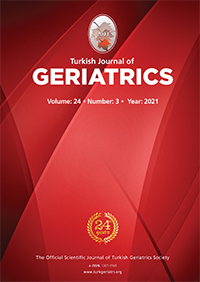2Kahramankazan State Hospital, Department of Cardiology, Ankara, Turkey DOI : 10.31086/tjgeri.2021.234 Background: Patients over 65 years of age with non-ST segment elevation myocardial infarction are at higher risk of mortality and morbidity than younger patients. The prognostic nutritional index is a combined immunologicalnutritional status score based on serum albumin levels and lymphocyte values. We evaluated the association between prognostic nutritional index value and all-cause mortality in elderly patients with non-ST segment elevation myocardial infarction. The current study presents the first evaluation of prognostic nutritional index in elderly patients with non-ST segment elevation myocardial infarction.
Methods: This was a retrospective observational study. The study population was divided into two groups according to their admission prognostic nutritional index. A prognostic nutritional index of 46 was determined as the optimal cutoff value to predict the primary endpoint, which was all-cause death during the follow-up period.
Results: Compared to patients with a prognostic nutritional index ? 46, those with a prognostic nutritional index < 46 were older (p < 0.001) and more often had a history of hypertension and known coronary artery disease (p = 0.001). All-cause mortality was significantly higher in the group with lower prognostic nutritional index (12.5% vs 4.8%; p = 0.007). The prognostic nutritional index predicted the primary endpoint, and this prediction was statistically significant (sensitivity 71%; specificity 67%). Univariate Cox regression analyses and multivariate Cox regression analyses showed that a cut-off level of prognostic nutritional index < 46 was significantly associated with the primary endpoint.
Conclusions: The prognostic nutritional index score was associated with all-cause mortality in elderly patients.
Keywords : Mortality; Non-ST Elevated Myocardial Infarction; Nutrition Assessment
